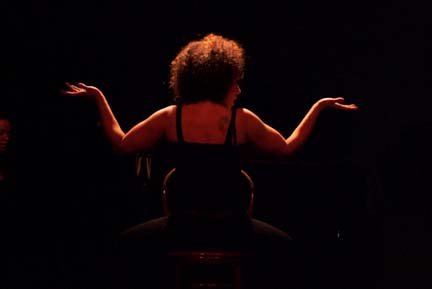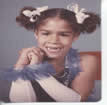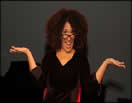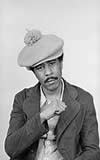
Reviews
Los Angeles Times by David C. Nichols To Be Young, Jewish and black Irreverent hilarity spices up "Fried Chicken and Latka's," ...
Rain Pryor's account of growing up black, Jewish and Richard Pryor's daughter
is an effective showcase for ripe talent.
Review by Jeremy Austin. Published Friday 18 August 2006 Ella, Meet MarilynPleasance Dome  Writer and critic Bonnie Greer has created in Ella, Meet Marilyn a show that entertains, informs and does absolute justice to two of the icons of American entertainment. Based on their real-life friendship, Greer uses her characters to explore pre-Civil Rights America and how behind the veneer of showbusiness gloss was the grubby world of political and social oppression. Fitzgerald, for all her stardom, was still viciously attacked by apartheid America - singled out for body searches, ripped off, abused - while Monroe, with her own impoverished background, was desperate to be recognised as an intelligent woman rather than just a sexual object. Performances are excellent. Rain Pryor, who debuted at Edinburgh two year’s ago with her highly-praised autobiographical performance, has a rich soulful voice that does justice to Fitzgerald’s songs. Her characterisation - Ella both young and old - comes from deep within and she gives conviction to Greer’s words. Coronation Street star Sally Lindsay presents Monroe as a person caught up in her own stereotype - at once the woman desperate to make Shakespeare with Olivier through her own production company but also unable to shake the ditsy blonde. Her fight against McCarthyism is as surprising as it is admirable. A well-received show with an audience of mixed ages, this should tour well beyond Edinburgh.
FOURTH ONE 97.3 UK Ella Meet Marilyn
THEATRE GUIDE LONDON Ella, Meet Marilyn Pleasance Dome - In the 1950s Marilyn Monroe used her influence, and possibly her sexual favours, to get her idol Ella Fitzgerald a major night club booking that transformed the singer's career. Ella remained forever grateful, while also chafing under the burden of Marilyn's emotional neediness. This is the basis for Bonnie Greer's new play, whose biggest weakness lies in unremittingly cliche-filled dialogue but whose strength is in its imagined characterisations of the two women - Marilyn the perpetual innocent who imagines herself worldly-wise enough to offer career and life counsel, and Ella the experienced and street-smart woman who nonetheless demands the right to hang on to her dreams. Sally Lindsay wears the white dress and attempts the breathy little-girl voice, but in no way looks like, sounds like or evokes the spirit of Monroe. Rain Pryor plays Fitzgerald as generic older-black-woman, which may even be accurate. But every few minutes the play stops to allow Pryor to sing, not in Ella's style but in her own strong blues-and-jazz voice, and I would say that alone was worth the price of admission except that Pryor is also appearing nightly at another venue without an uneven play to stand between her singing and us. Gerald Berkowitz
BackStage West by Brad Scheiber
Say loud: "I'm black, Jewish, and proud." That update of a 1960's aphorism
would seem appropriate for Rain Pryor, whose cabaret-style show exhibits
an impressive range of talent, from comedy and drama to singing and shaking
one's groove thing. The daughter of Richard Pryor, she complains not only
of the confusion of race and religious identity but also of familial antagonisims.
Apparently her famous father bought her a multicolored Afro wig and a Mr.
Microphone while her half sister got a house and trust fund.
Pryor ‘Reigns’ at The Canon Theater By Jerome Robinson Tolucan Times |
||||||
CBS MORNING NEWS
Rain Pryor: Shalom, My Brothers
April 18, 2004
Rain Pryor took center
stage in the place that launched her father, Richard Pryor, into the comedy
stratosphere – The Comedy Store
"I mean, here I am at the Comedy Store! On the very stage, in the very place that history was created by my father ... Richard Pryor," says Rain Pryor. "I used to sleep in booths out here."
The Comedy Story is now a door to
her future, as CBS News Correspondent Bill Whitaker reports.
"Is it intimidating at all? Of course it is," she says. "It's
intimidating, because I know, without a doubt, there's someone who's thinking
they're coming to see me, but they're really coming to see my dad … They
better go rent a video, because this ain't my daddy's standup."
It's her show,
"Fried Chicken and Latkes." Rain has been polishing and performing it in
theaters around Los Angeles. It's about her life as the conflicted daughter of a
celebrated black father and a Jewish mother.
"So there I was, this black
and Jewish kid growing up in Beverly Hills, which meant I was proud, ... but
felt so guilty for it," she laughs from the stage.
She says she has
wanted to do the show for the last decade, but she wasn't ready until now.
"I wrote this show in three-and-a-half weeks, you know, and it was out
and it was done," she remembers.
Vivid characters came pouring out as a
result. She portrays white teenager Samantha:
"Oh, my God, Rain. Your
hair is soooo big! Oh, I can barely see the mirror through your big hair! Like
what do you have in there, anyway? You are soooo Afro-sheen Barbie!"
Like a chameleon, Rain changes into Wanita:
"As a matter of
fact, girl didn't know she was black until she met me. And she was always going
out with white boys. But she did date a black boy like, what? Once. And he
wasn't all the way black. He was like -- blackinese."
"There's not a
thing about her that doesn't work," says actor/director Carl Reiner. "She sings,
she moves, she does humor. She knows who she is."
Rain fills the stage
with characters who filled her life, such as her Jewish grandmother:
"Why do we light the Friday night Shaboos candles? We do this to welcome
in the weekend by reflecting back on what we have done during the week. But we
try not to reflect too hard, because that's why we become depressed."
Pryor also transforms into "Mama," her father's grandmother:
"Rain was born on her father's side to a prestigious line of pimps,
madams and prostitutes. See, Richard Pryor is a fine and generous man. You can
ask any hooker."
And woven throughout the show is Rain's complex
relationship with her father.
"Papa, can you hear me? Papa, can you see
me? See me? He barely even knew me. He was too busy making movies and [mimics
smoking] had way too much on his mind," she says in her act.
In her work
and her life, she has had to come to terms with Richard Pryor, the man the world
knows as a tragic comic genius.
Rain knows all about his genius and his
flaws: his womanizing and, as she told Sunday Morning's Russ
Mitchell in 1995, his drugs.
"It was really Dr. Jekyll and Mr. Hyde.
When he wasn't experimenting with chemicals, he was there. When he was, it was
another -- it was tough," she said in the interview.
It was also tough on her strong-willed mother, who raised Rain after Richard
Pryor left them.
In "Fried Chicken and Latkes," she remembers her mother saying:
"Rain, take that plastic bag off your head! This won't bring your father to visit. You know why, Rain? He doesn't care, Rain! He doesn't care! When he left us and we went on welfare, it was me who got us off, Rain! I am the black man
in your life, Rain."
She says she talks about some very painful things in
her life because life is painful.
"I've survived a lot of stuff that I
think someone of 34 shouldn't have to really survive, but I survived it, and I
think with that, there comes a freedom," she says.
It's that freedom to
make comedy out of her own battle with drugs and alcohol, her string of failed
romances and her father's succession of wives.
The show is what she's always
dreamed of doing.
"Out of the womb, the day I was given the
rainbow-colored Afro-wig, the diva in me came out," she laughs.
She
found work early as a regular on the sitcom "Head of the Class" and on stage in
the musical "Sisterella."
But even as she played a lesbian junkie on
Showtime's "Rude Awakening," Hollywood told her she wasn't black enough, she
wasn't white enough, she wasn't pretty enough.
"Then I wasn't working at
all and it was really hard for me, because for years after that, all I heard
was, 'Yeah, she's talented, but God, she's ugly,'" remembers Pryor.
Casting agents just couldn't figure her out. Now she's finding herself,
a process that may have begun with her father's illness. She took questions
after one performance.
"When he got sick with multiple sclerosis, I
think it put everything to me into perspective. I think there comes a place
where you really have to have peace," she says.
Accepting her father,
she came to accept herself. In the mid-'90s, they even played father and
daughter in a "Chicago Hope" episode about M.S.
By her 2002 wedding, he
couldn't walk her down the aisle, but he was there. And Rain Pryor's mother,
Shelly Bonis (former hippie and civil rights advocate), is out advocating for
her daughter. Bonis is out in the streets and fairs giving people cards about
her daughter's play.
Elizabeth Pryor -- Richard other half-Jewish
daughter from another marriage -- came to see Rain's show. And, the two have
fallen in love.
"I think I didn't realize there was only one other black
Jew who was Richard Pryor's daughter, and that was my sister," says Elizabeth
Pryor. "When I saw 'Fried Chicken and Latkes,' I thought 'Black, Jew, Richard
Pryor's daughter -- oh, my God! We have a lot in common!'"
But Rain's
personal story, which she considered so idiosyncratic and so outrageous, seems
to have something to say to most everyone who comes through the door.
Now clean and sober, married, happy and with plans for Broadway, Rain's
past is powering her into the future.
"Because I'm standing on my own
two feet and I have become Rain, I am comfortable with being a Pryor," she says.
"I feel it's my right, it's my legacy. What I'm doing up there on that stage is
the real tribute.
"I'm black and a Jew! Shalom, my brothers! Oy vey!"




